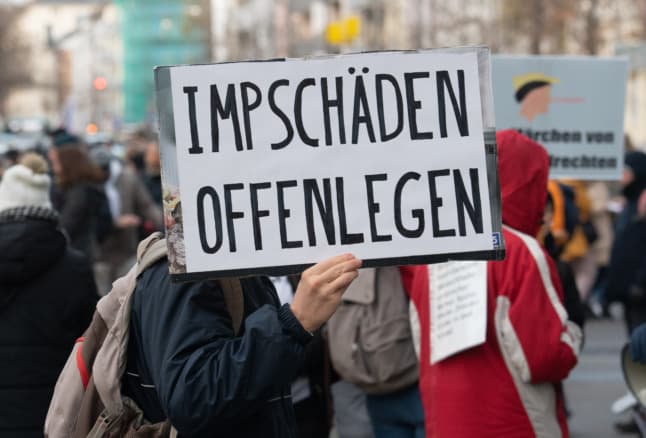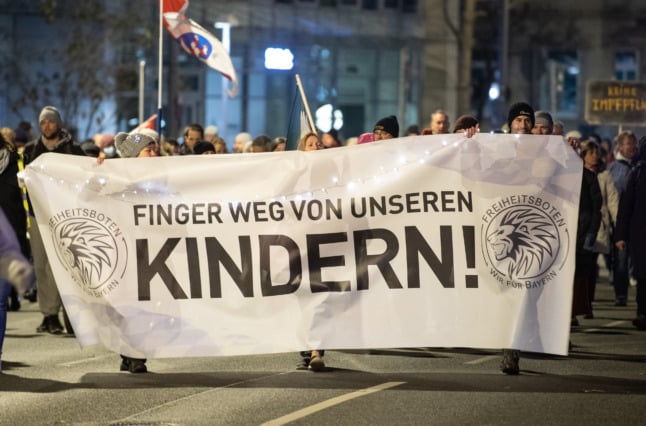Germany's new government condemns 'aggressive' anti-vax movement

In a press conference held after the signing of the new government's coalition agreement in Berlin, incoming Chancellor Olaf Scholz slammed 'threatening' protests against Covid restrictions and vaccinations.
"We must react decisively against violent demonstrations," Scholz said. Referring to a recent protest staged outside the private house of Saxony's Health Minister, Scholz said these kinds of actions could only be interpreted as a "threat".
"As democrats, we reject that decisively," he added.
His comments were echoed by Green Party co-leader Robert Habeck, who is set to head up the newly formed Ministry of Environment, Energy and Economy from Wednesday.
"The fact that we need a higher vaccination rate isn't up for debate," he said.
"It becomes problematic when, out of the multitude of different reasons (for not getting vaccinated), a movement arises - not necessarily against vaccination, but against the state, against a free and open democracy," he added.
On Friday evening, 30 protestors with torches and placards arrived at the house of Saxony's health minister Petra Köpping (SPD) to demonstrate against the current Covid lockdown in the state.
The action, which had to be broken up by the police, was allegedly supported by a far-right extremist group called the Free Saxons. Politicians around the country have since condemned the gathering as threatening and anti-democratic.
Demonstrations against current Covid measures have been ramping up in Germany as the incoming government moves to bar unvaccinated people from most areas of public life, including non-essential shops.
READ ALSO: KEY POINTS: Germany’s new Covid rules to fight fourth wave
The country has also introduced contract restrictions that prevent unvaccinated people from meeting more than two other people at a time.
Critics of the measures claim that the moves risk sowing more division in an already divided society, but Scholz defended the move on Tuesday, claiming the German population was "not split" but rather "of one mind".

A group of anti-vaxxers demonstrate with a sign that reads: "Hands off our children!" in Hannover, Lower Saxony. Photo: picture alliance/dpa | Boris Roessler
"We have to do everything in our power to protect the population, and we’ll only succeed if as many people as possible are vaccinated," said Scholz.
"We need restrictions, particularly for the people who haven’t got vaccinated, because there’s no doubt whatsoever that it's the people who aren’t vaccinated who are driving the high infection rates."
After representatives from the 'traffic light' coalition parties - the SPD, Greens and FDP - signed their 177-page coalition agreement on Tuesday, the new government is due to be sworn in on Wednesday.
First on the agenda in parliament will be voting in a range of new Covid measures such as a vaccine mandate for healthcare professionals and additional powers for German states to order restaurant and bar closures during the pandemic.
READ ALSO: Could German states order bar and restaurant closures under new Covid laws?
The new government will also hold a vote on whether the bring in compulsory Covid jabs for the general population.
Asked to share the coalition's position on the issue, incoming Finance Minister and FDP leader Christian Lindner said the parties had "no fixed position". Every MP will be able to vote with their conscience and across party lines, he explained.
As of Tuesday, 69.1 percent of the German population was fully vaccinated, while 17.5 percent had received a booster jab.
The government is aiming to carry out 30 million jabs by Christmas as it seeks to dampen the Covid fourth wave.
Comments (5)
See Also
"We must react decisively against violent demonstrations," Scholz said. Referring to a recent protest staged outside the private house of Saxony's Health Minister, Scholz said these kinds of actions could only be interpreted as a "threat".
"As democrats, we reject that decisively," he added.
His comments were echoed by Green Party co-leader Robert Habeck, who is set to head up the newly formed Ministry of Environment, Energy and Economy from Wednesday.
"The fact that we need a higher vaccination rate isn't up for debate," he said.
"It becomes problematic when, out of the multitude of different reasons (for not getting vaccinated), a movement arises - not necessarily against vaccination, but against the state, against a free and open democracy," he added.
On Friday evening, 30 protestors with torches and placards arrived at the house of Saxony's health minister Petra Köpping (SPD) to demonstrate against the current Covid lockdown in the state.
The action, which had to be broken up by the police, was allegedly supported by a far-right extremist group called the Free Saxons. Politicians around the country have since condemned the gathering as threatening and anti-democratic.
Demonstrations against current Covid measures have been ramping up in Germany as the incoming government moves to bar unvaccinated people from most areas of public life, including non-essential shops.
READ ALSO: KEY POINTS: Germany’s new Covid rules to fight fourth wave
The country has also introduced contract restrictions that prevent unvaccinated people from meeting more than two other people at a time.
Critics of the measures claim that the moves risk sowing more division in an already divided society, but Scholz defended the move on Tuesday, claiming the German population was "not split" but rather "of one mind".

A group of anti-vaxxers demonstrate with a sign that reads: "Hands off our children!" in Hannover, Lower Saxony. Photo: picture alliance/dpa | Boris Roessler
"We have to do everything in our power to protect the population, and we’ll only succeed if as many people as possible are vaccinated," said Scholz.
"We need restrictions, particularly for the people who haven’t got vaccinated, because there’s no doubt whatsoever that it's the people who aren’t vaccinated who are driving the high infection rates."
After representatives from the 'traffic light' coalition parties - the SPD, Greens and FDP - signed their 177-page coalition agreement on Tuesday, the new government is due to be sworn in on Wednesday.
First on the agenda in parliament will be voting in a range of new Covid measures such as a vaccine mandate for healthcare professionals and additional powers for German states to order restaurant and bar closures during the pandemic.
READ ALSO: Could German states order bar and restaurant closures under new Covid laws?
The new government will also hold a vote on whether the bring in compulsory Covid jabs for the general population.
Asked to share the coalition's position on the issue, incoming Finance Minister and FDP leader Christian Lindner said the parties had "no fixed position". Every MP will be able to vote with their conscience and across party lines, he explained.
As of Tuesday, 69.1 percent of the German population was fully vaccinated, while 17.5 percent had received a booster jab.
The government is aiming to carry out 30 million jabs by Christmas as it seeks to dampen the Covid fourth wave.
Join the conversation in our comments section below. Share your own views and experience and if you have a question or suggestion for our journalists then email us at [email protected].
Please keep comments civil, constructive and on topic – and make sure to read our terms of use before getting involved.
Please log in here to leave a comment.